Sheryl Sandberg, the COO of Facebook was asked the below question in an interview:
“What’s the number one thing you look for in someone who can scale with a company?”
Here’s her answer:
“Someone who takes feedback well. Because people who can take feedback well are people who can learn and grow quickly.”
Collecting feedback and using them to learn can help you grow your business within a short period of time.
Content marketing is, no doubt, one of the most effective digital marketing strategies. But a lot of entrepreneurs and marketers struggle with it.
Why?
This article points out why content marketing may not be working for your business and what you can do to fix it.
Before I proceed, I’ll like you to know that this article isn’t for everybody.
I assume that you’ve been investing in content marketing and aren’t seeing returns to justify your investments.
I also assume that you’re serious about making content marketing work harder for your business and willing to follow instructions laid out on this page.
There are ten reasons why content marketing may not be working for your business.
Let’s find out what they are and how you can fix them.
1. You’re not getting backlinks on a consistent basis
There are more ways to drive traffic to your website today than years ago.
You have Facebook, Facebook Ads, Google, Google AdWords, Medium, Twitter, LinkedIn, Pinterest, Bing, Instagram, YouTube, Quora, Reddit, etc.
Search engines, especially Google and Bing are my favorite traffic drivers.
“…The clear champion of website traffic is organic search. Overwhelmingly, organic search trumps other traffic generators, driving 51% of all visitors for both B2B and B2C businesses.” – BrightEdge, Cracking the Content 2014
Search engines send visitors that are more likely to convert than any other traffic source.
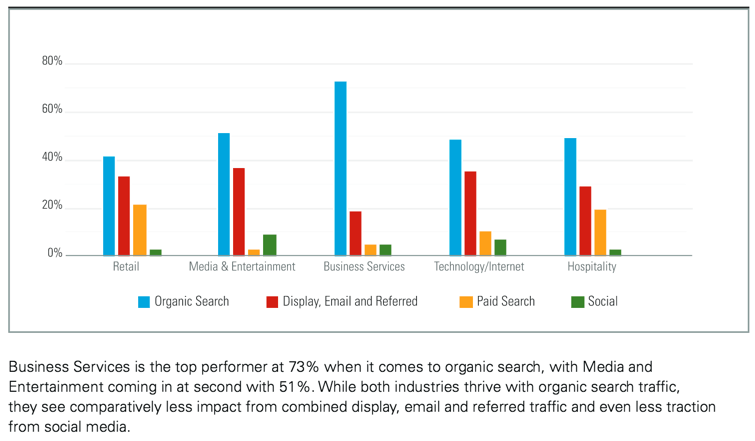
Social media channels like Facebook, Twitter, and Instagram can send thousands of visitors to your site, but they are not always reliable for creating customers.
Social media users tend to leave the site quickly because they are not on social media to buy products from companies. Their number one reason for being on social media is to connect with friends.
Organic search is different.
Web users are on search engines to find solutions to their problems. Search engines present content that matches the intent of its users.
Success on search engines depends on link building.
What is link building?
“Link building is the process of acquiring hyperlinks from other websites to your own.”
You need better and more backlinks than competitors to succeed in search engines.
Link building isn’t something you do once and forget about. You have to be consistent with it. It’s something you must continue doing as long as you want to keep ranking for a particular keyword that’s relevant to your business.
It’s something you must continue to do if you want to keep ranking for a particular keyword that’s relevant to your business.
Many business owners would say “let’s build ten backlinks this month and we’ll do it again six months after,” or “let’s build ten backlinks for every keyword we are targeting.”
Link building doesn’t work that way.
Let’s assume your company sells email marketing software.
Keywords like “email marketing software,” “email marketing tools,” “email marketing tips” and “email marketing service” are all related to your business. These keywords are competitive because your competitors are also targeting them.
These keywords are competitive because your competitors are also targeting them.
You need to prioritize consistency if you have limited resources.
You can’t build 500 backlinks for each keyword and hope for success.
Pick one or two keywords and give them everything until you’re on the first page of Google. And you can’t rest on your laurels.
Search engines can drive targeted traffic to your website. But consistency in link building is the key to success in search engines.
2. Visitors don’t find your content useful
If visitors don’t find your content useful, no amount of search engine optimization and social media marketing tactics will help you acquire a good number of customers from content marketing.
Web users will value your brand more if they find your content meaningful and useful.
Nancy Duarte, the CEO of Duarte, a presentation design agency, wrote that changing her book price to free increased downloads and the company got a lot of traffic. Revenue increased by a huge percentage as a result.
Revenue increased by a huge percentage as a result.
The company also published a slide document on SlideShare, which has been seen over 268,000 times, and drove 100,000 visitors to their website and generated 21,420 e-mail addresses for the business.
For example, Louis Vuitton is a fashion brand.
They created a video titled “The Art of Packing.” This is useful content for their ideal customers.
MR PORTER is an online retail destination for men’s style.
The brand maintains a blog called The Journal where they publish content that targets their ideal customers, who are men.
Recently, they published an article titled “Which Beard is Right for You.”
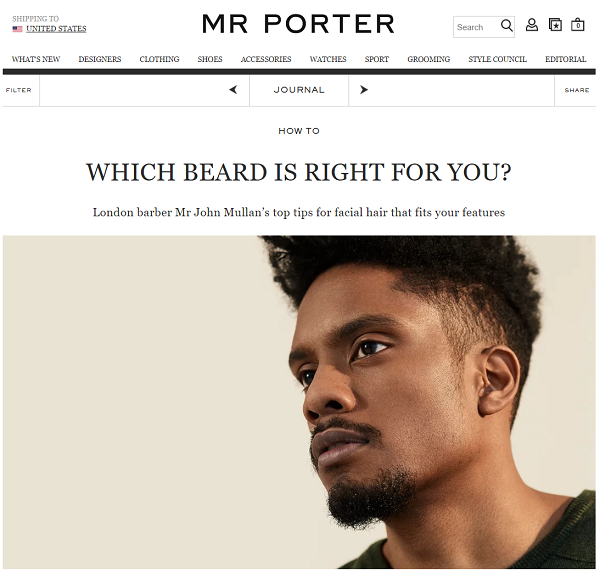
You don’t need to be a Pulitzer Prize-winning writer to create useful content for your target audience. You just need to be efficient.
The key here is to research and plan.
Who is your target audience?
Maybe they are stay-at-home moms or teens.
What phrases are they typing into search engines?
Perhaps, they are typing phrases like “how to dress like your favorite painting” or “how to get fit for the holiday.”
Check the sites that are ranking high in Google for phrases that are relevant to your business.
What are they missing that you can add to your content?
Make your content more useful by adding more examples, images, videos, illustrations, or case studies.
Find holes in competitors’ content and fill them.
For example, breast augmentation is a hot topic among women.
Let’s assume that you’re a breast surgeon and want to drive more traffic from search engines.
The keyword “breast augmentation” is a popular keyword on Google.
This Cosmopolitan article titled “21 Things You Should Know Before Getting a Boob Job” currently ranks high for that keyword and lots of other keywords related to breast augmentation.
According to data from Ahrefs, this article receives 23,000 visits from search engines.

When you look at the content, you’ll agree that there’s room for improvement.
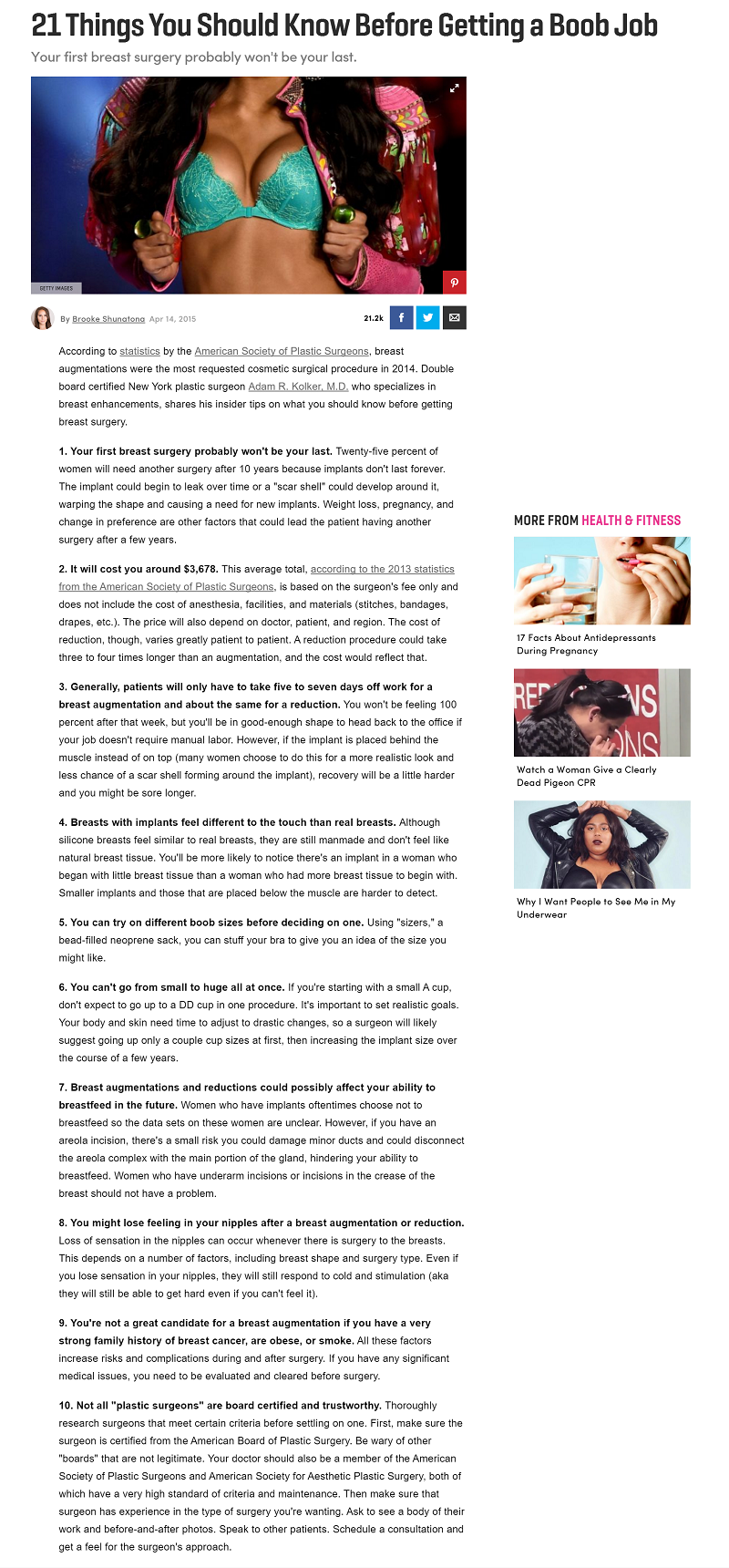
The post has no images, videos, quotes from any authority or influencer. If you can create something better, you’ll get lots of backlinks and social shares.
If you can create something better, you’ll get lots of backlinks and social shares.
As a result, your content will receive more relevant visitors from both social media and search engines.
3. You don’t put much time and money into content marketing
Budgets for content marketing have increased every year since 2010.
Nine out of ten B2B marketers are doing content marketing.
B2C companies are also doing content marketing. In fact, 73% said they expect to produce more content in 2017.
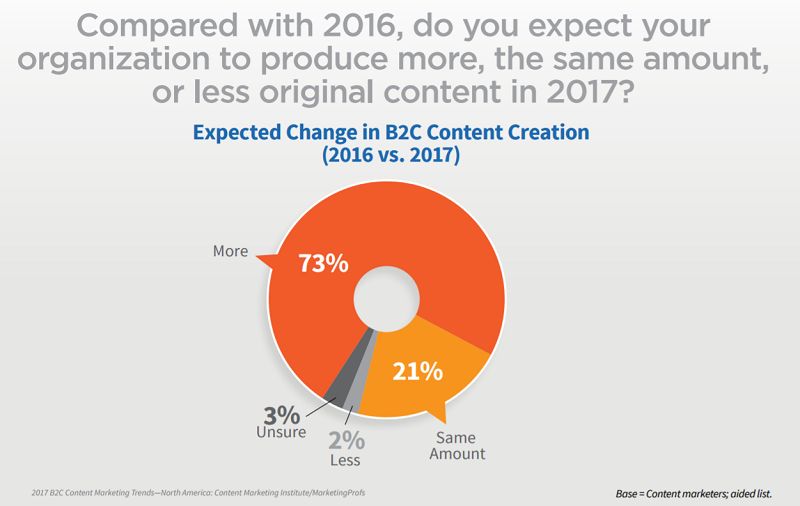
Forty-six percent of B2C companies said content marketing is more effective for them than one year ago.
If you run a B2C business, it means you should expect even more competition this year as companies increase their investments in content marketing.
As companies increase their budgets and time in content marketing, you can’t continue doing the same thing and expect better results.
Put more money and time into developing a strong content marketing strategy. That’s how you can get better returns on your investment
4. You’re doing everything by yourself
If your business is a one-man show, you’re already doing a lot.
Throwing content marketing into the mix is only going to make things more difficult.
Content marketing alone is a monster on its own. It requires different skills.
Below are the basic skills needed to execute a great content marketing campaign:
- Research. Learning and gathering data about your ideal customers. You need data to create high-quality content.
- Photoshop. You need this to create images for social media updates and blog posts.
- Copywriting. Write blog posts, social media updates, and emails.
- Editing and proofreading. A single grammar error can embarrass your brand online.
- Link building. This involves reaching out to bloggers and influencers and convincing them to link to your website in order to increase your authority in search engines.
- PR. This is the process of getting major news outlets and authority sites to write about your company.
And more!
Unless you’re superhuman, it’s impossible to be good at all these things.
Another big challenge is time.
We all have 24 hours a day.
No way you can do all these things in a single day and still have time to run your business.
For example, Larry Kim is a writer and co-founder of WordStream, a search marketing company based in Boston.
Recently Larry Kim published an infographic on Medium.
When you scroll down to the bottom of the infographic, you’ll see a note that says “Presented by WordStream.”
That’s the job of a designer.
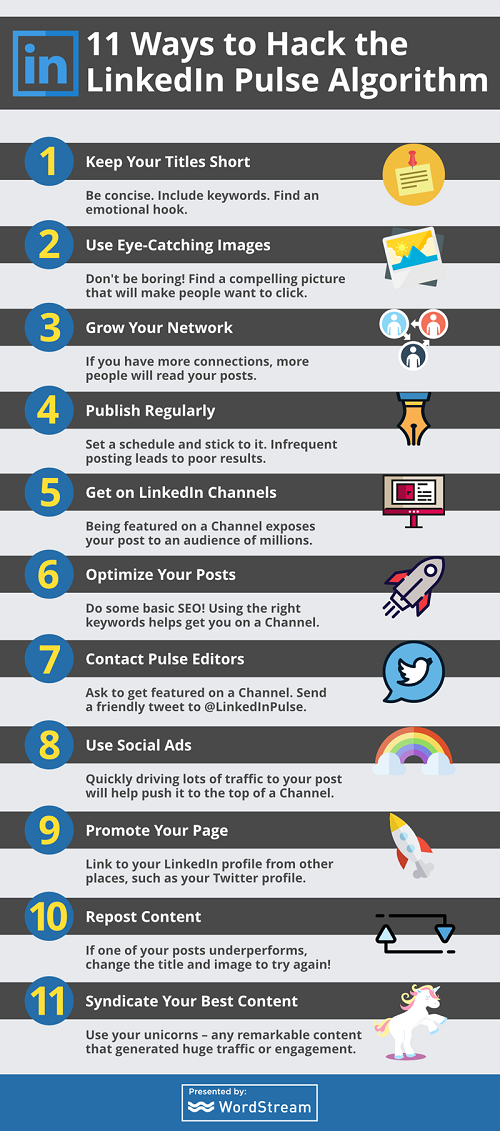
Hard to imagine Larry designing an infographic while at the same time having time to write and promote his companies.
That’s why you need help.
There’s a limit to what you can do.
If you’re really serious about getting a lot of customers through content marketing, be ready to hire people who have the skills and time to do tasks you can’t do.
5. You don’t have a conversion funnel
Most visitors who land on your site through your content aren’t ready to buy. At least, not immediately.
Perhaps, they are not thinking of buying your product or service at all because they like what they are getting from your competitors.
Because someone isn’t willing, thinking, or ready to do business with you the first time they visited your site doesn’t mean they can’t become customers in the future.
You’re losing a lot of potential sales if you’re currently neglecting these visitors.
Content marketing alone isn’t enough to convert visitors into customers.
You need to build a conversion funnel.
According to Conversioner:
“Conversion funnel is the path the website visitor follows before making a purchase.”
You shouldn’t just ask someone to buy a product.
They should be educated about the product.
They should know why they need it, the benefits it offers, and what they’ll miss if they don’t buy.
Here’s a perfect illustration of a conversion funnel:
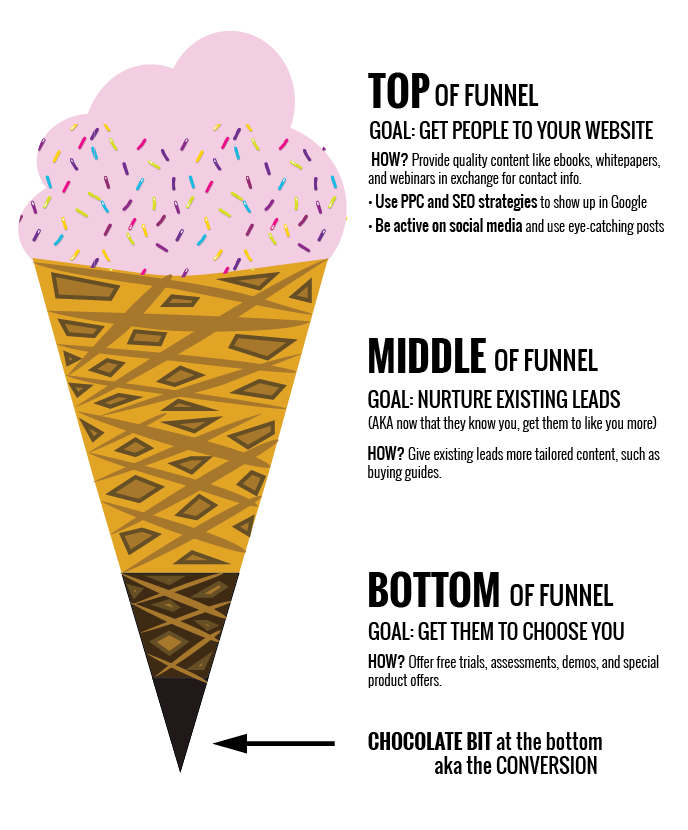
Various businesses have different conversion funnels that fit their business models and match their customers’ behaviors.
If your ideal customers are the most senior executives in organizations, your conversion funnel may have a stage where you need to call these top people.
For example, if you’re running a company that sells iPad POS and Business Platform as Revel Systems does, you’ll need to call business owners who use POS.
How your conversion funnel looks like depends on the complexity of your product and the people who need it.
When 10,000 people land on your site, it’s impossible to turn all of them into customers.
The people who will become customers need to go through some stages.
This could mean asking for visitors’ email addresses by offering them a free e-book or an e-course in return.
Then making them aware of a problem they have using email marketing, before introducing your product as a perfect solution.
Email marketing software lets you set up your conversion funnel once, and it will repeat the process for every new visitor.
Having a conversion funnel will help you develop better relationships with potential customers before asking for the sale. It increases your chances of turning more visitors into customers.
6. You are not promoting your content
There are two components of content marketing:
- Content creation
- Content promotion
Most digital marketers tend to focus on the first part and neglect the second part.
Many people spend more time creating content than promoting content. Wrong.
Content promotion is more important than content creation.
Derek Halpern of Social Triggers follows the 80/20 rule. It means 80% content promotion and 20% content creation.
Brian Dean confessed to sending more than 250 emails to promote a single blog post.
Buffer’s co-founder, Leo Widrich, wrote around 150 guest posts in a nine-month period promoting their product.
Here are 15 effective ways to promote your content:
- Share it on Facebook
- Share it on Twitter
- Share it on a relevant Subreddit
- Advertise it on Facebook
- Reach out to influencers
- Reach out to sharers of similar content using a tool like Buzzsumo
- Turn your content into a slide deck and publish it on Slideshare
- Send it to your email list
- Republish it on LinkedIn
- Republish it on Medium
- Share it on Facebook Groups
- Use it to answer relevant questions on Quora
- Turn it into an infographic
- Publish guest posts and link to your content
- Target keywords in your posts for SEO
7. Influencers are not sharing your content
Your content may be smart, inspiring, fantastic and still receive zero attention.
Why?
Being a superior content creator alone isn’t enough to succeed in the digital world. You need more.
You need help from other content creators in your industry.
Guys like Brian Dean built a successful B2B site within a short time because influencers shared his content with their followers.
BuzzSumo analyzed the social share counts of over 100 million articles and found that getting one influencer to share your content can result in 31.8% more social shares. That is how content go viral online. Through influencers.
Getting three influential people to share your content can double the number of social shares your content receive.
What if you can get five influencers?
That guarantees each content you publish becomes a success.
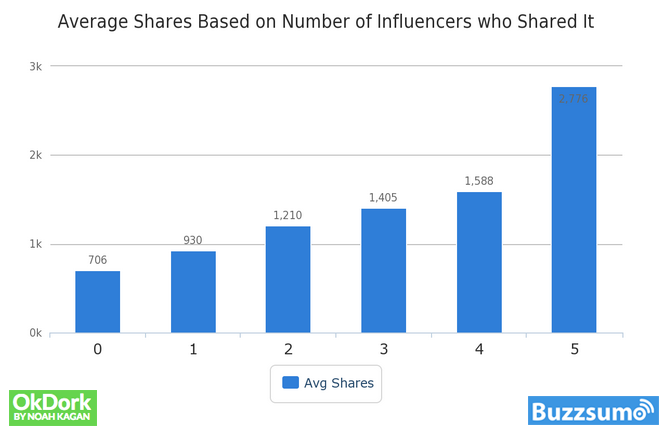
Influencers are active content creators with a good number of fans who care about them and what they share.
Influencers can be active Facebook users with massive fans. They can be Twitter users, Instagrammers, YouTubers, or bloggers.
Influencers are authorities, knowledgeable, and respected in their fields.
You need the help of influencers to increase the reach of your content and acquire more customers.
8. You’re in a competitive niche
Let’s assume that you’re doing content marketing in a tough niche where most of your competitors are established brands who have all the resources and talents to swallow your business. What should you do?
Should you simply forget about content marketing?
No!
If you’re in a niche where your competitors are regularly publishing amazing content, you can still compete.
A tough competition indicates that you can specialize. Dig deeper.
For example, if you’re in the photography niche, it’s too competitive. Instead, specialize in wedding photography, or graduation photography or even vacation photography.
Meg runs Snap Happy Mom, a blog about photography tips for moms.
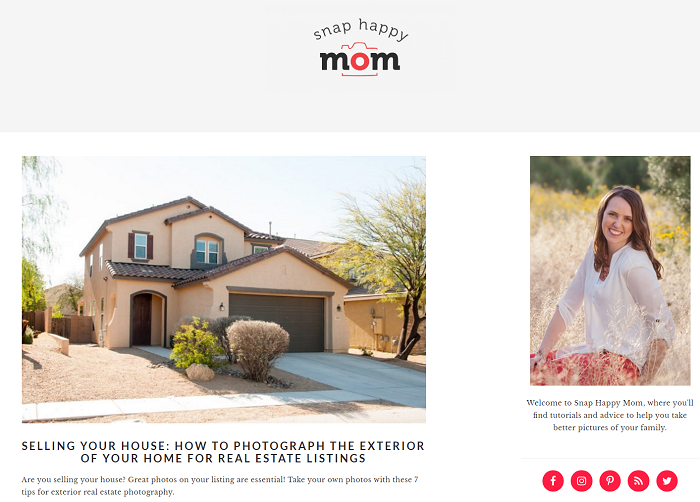
Create content that targets specific people your competitors are currently ignoring.
The niche may be small, but you’ll have a better chance of reaching your ideal customers than attracting everyone.
9. You want quick results within a short time frame
Here’s the harsh truth many don’t want you to know:
Content marketing takes time, plus the process is boring.
But content marketing can add huge value to your business.
Content marketing can make you a thought leader in your industry. People won’t see you as a thought leader after seeing a few videos or articles from you.
You’ll have to continue delivering high-quality content on a consistent basis for a long time before people can start to pay more attention to your name and business.
The main goal of content marketing is to make people familiar with your name and business. You can’t achieve that within a short time.
Look at people like Neil Patel, Gary Vaynerchuk, Rand Fishkin. These people have been doing content marketing for a long time. That is why their names are spread across the web.
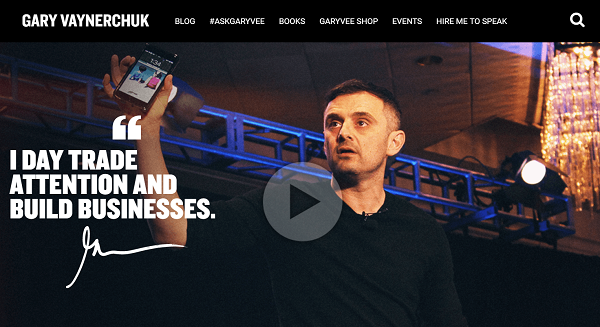
If you’ve only been doing content marketing for a few months, then you shouldn’t be expecting any worthwhile results yet.
Content marketing takes, at least, between six months to a year to start generating real results.
10. You don’t enjoy creating content on a daily basis
To create compelling content, writing should interest you.
If you don’t enjoy writing, readers will sense it from your work. It’s not so hard to do.
Imagine seeing a TV host presenting on your television. If the presenter doesn’t like his/her job, the feeling will come through the screen. You’ll touch the dial immediately you sense it.
To do something well, you have to like it.
If you like content marketing and hate writing, it means you need someone who’s truly passionate about writing.
There are many talented writers on the web you can hire for your business.
What other reasons you believe is making content marketing not work for your business?
Tell me in the comments.
